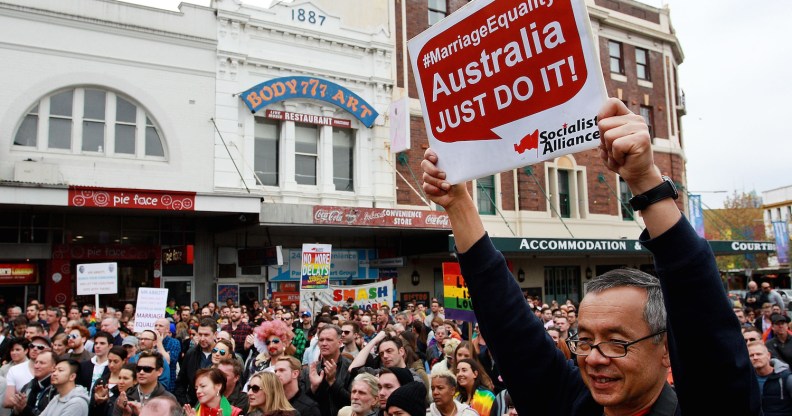Australian law reforms do not extend to gay marriage

The Australian government has announced over 100 reforms that will give gay couples the same rights as straight couples.
The move has been welcomed by LGBT groups but has drawn criticism over the refusal to legalise ‘gay marriage’.
Under the changes, gay couples in long-term relationships would be treated the same as married couples on issues such as taxation, pensions and welfare payments.
Attorney General Robert McClelland announced that the Labour government would introduce legislation next month to remove same-sex discrimination from some 100 laws.
McClelland told reporters in Canberra:
“The changes will provide for equality of treatment in a wide range of areas including superannuation, taxation, social security, workers compensation and pharmaceutical benefits,”
“These will make a practical difference to the lives of a group of fellow Australians who, for far too long, have suffered discrimination at a Commonwealth level.”
The Victorian Gay and Lesbian Rights Lobby (VGLRL) today welcomed the Rudd Governments announcement that they will remove same-sex discrimination.
“We are thrilled to hear the Rudd Government has honoured their election promise to gay & lesbian Australians.” said Mr Stephen Jones, VGLRL Co-convenor.
“This reform is long overdue. Gay & Lesbian Australians have been discriminated against for too long. We look forward to working with the government on the detail of the bill to remove the discrimination in the many complicated area’s of legislative reform.”
“Today’s announcement removes discrimination in practical areas such as tax, superannuation, social security, health, aged care, veteran’s entitlements, workers compensation – the list is too long to mention.”
“The removal of the 100 odd pieces of legislation against same-sex Australians will have a real financial impact on everyday ordinary gay & lesbian Australians.”
However, LGBT group ‘Australia Marriage Equality’ (AME) has criticised the government for not going far enough:
“The Federal Government has got it wrong by asserting that discrimination is only about financial entitlements,” said AME national convener, Peter Furness.
AME also criticised the Government for the complexity of it’s plans:
“With around 100 Acts to be amended, this is an extraordinarily complex way to deliver financial equality when the government could simply amend a few words in the marriage act.”
“The Rudd Government’s policy to recognise same-sex relationships through state-based registers may have the blessing of anti-gay hate groups like the Australian Christian Lobby, but it does not grant same-sex couples the dignity, respect and equality they deserve.”
Attorney General Robert McClelland insisted:
“We made it clear before the election that the government regards marriage as being between a man and a woman and we don’t support any measures that seek to mimic that process.”
Marriage, as defined by the civil law, is presently available to same-sex couples in five countries.
The Netherlands was the first country to allow same-sex marriage in 2001. Same-sex marriages are also recognized in Belgium, Spain, Canada and South Africa.
The first same-sex union in modern history with government recognition was obtained in Denmark in 1989.
Civil unions, civil partnership, domestic partnership, unregistered partnership/ unregistered co-habitation or registered partnerships offer varying amounts of the benefits of marriage and are available in:
Andorra,
Colombia
Croatia
Czech Republic
Denmark
Finland
France
Germany
Hungary
Iceland
Israel
Luxembourg
New Zealand
Norway
Portugal
Slovenia
South Africa
Sweden
Switzerland
United Kingdom
Uruguay.
They are also available in some parts of Argentina, Brazil (Rio Grande do Sul), Mexico, the U.S. states of California, Connecticut, Hawaii, Maine, New Hampshire, New Jersey, Oregon, Vermont, Washington state, and the District of Columbia (Washington, D.C.).
In the United Kingdom, civil partnerships have identical legal status to a marriage, and partners gain all the same benefits and associated legal rights; ranging from tax exemptions and joint property rights, to next-of-kin status and shared parenting responsibilities.

